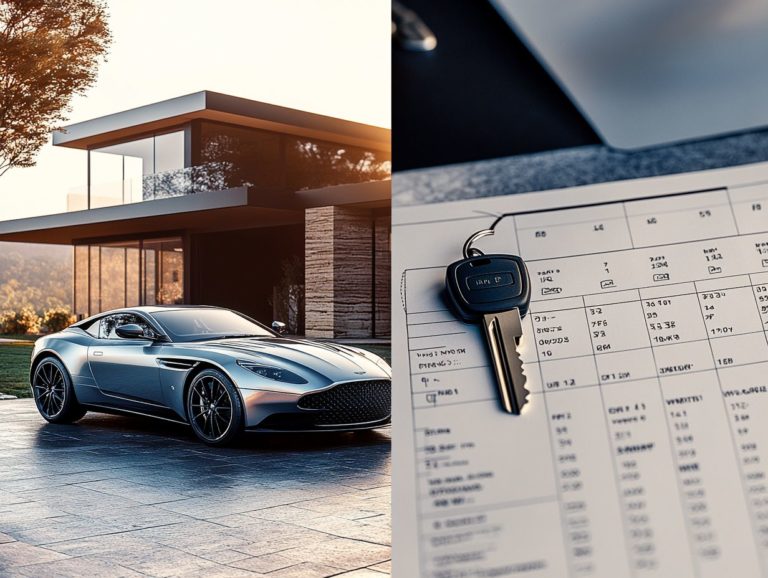The Benefits of Zero Down Financing Options
Zero down financing presents an enticing opportunity for many aspiring homeowners and those in the market for new vehicles. It provides a pathway to secure a purchase without the burden of a large upfront payment.
This article delves into the nuances of zero down financing, highlighting its advantages, such as immediate financial relief and enhanced opportunities for homeownership. However, it s essential to consider the potential risks that accompany this option.
Explore a variety of financing avenues, eligibility criteria, and alternative low down payment strategies. Grasping these elements equips you to make informed decisions that align with your financial goals.
Contents
- Key Takeaways:
- Understanding Zero Down Financing
- Advantages of Zero Down Financing
- Potential Risks of Zero Down Financing
- Types of Zero Down Financing Options
- How to Qualify for Zero Down Financing
- Alternative Options for Low Down Payments
- Exploring Other Financing Options
- Frequently Asked Questions
- What can zero down financing do for you?
- How does zero down financing work?
- What are the potential cost savings of zero down financing?
- What types of items or services can be purchased with zero down financing?
- Are there any drawbacks to zero down financing options?
- How can I determine if zero down financing is the right option for me?
Key Takeaways:

- Zero down financing options offer financial benefits, such as avoiding large upfront payments and allowing for more flexibility in budgeting.
- These options also provide opportunities for homeownership to those who may not have been able to afford it otherwise.
- While there are potential risks involved, understanding the requirements and exploring alternative options can help mitigate them.
Understanding Zero Down Financing
Zero down financing offers various mortgage options for those looking to buy a home without making a large upfront payment. This is especially helpful for first-time homebuyers eager to own their dream home.
Explore alternatives like government-backed loans such as VA and USDA loans. These can greatly ease the financial burden of traditional home buying.
Furthermore, down payment assistance programs and zero down payment loans empower eligible buyers to navigate the complex real estate market without substantial upfront costs.
Advantages of Zero Down Financing
Zero down financing provides numerous advantages for aspiring homeowners, particularly for first-time buyers. It significantly reduces the initial financial strain typically associated with purchasing a home.
This approach enables you to explore a broader range of homeownership opportunities without the usual hurdle of large upfront payments.
By tapping into various mortgage options, including government-backed loans, you can unlock financial benefits like reduced closing costs and lower monthly payments. These factors are crucial in helping you maintain a stable financial commitment.
Financial Benefits
The financial benefits of zero down financing are remarkable. This approach allows you to conserve your savings, redirecting those funds toward closing costs and monthly payments, ultimately making homeownership more attainable.
With various mortgage options available, from government-backed loans to conventional loans, you can discover solutions that align with your financial situation.
These financing options significantly reduce upfront costs, enabling you to enter the market without the strain of a hefty down payment. Zero down financing can also lead to lower mortgage insurance fees, especially with specific loan types like VA loans, which often do not require private mortgage insurance (PMI).
This means you might experience a noticeable difference in your monthly payments, potentially freeing up cash for other financial obligations. It s crucial to acknowledge that the benefits can vary based on your personal financial circumstances and the specifics of each loan type.
Therefore, taking the time to thoroughly evaluate your options is essential for making the most informed decision.
Opportunities for Homeownership
Zero down financing presents a remarkable array of opportunities for you as a potential homeowner, especially if you’re a first-time buyer grappling with traditional down payment hurdles. This innovative approach can turn your homeownership dreams into a tangible reality. By leveraging mortgage options like VA loans, FHA loans, and USDA loans, you can navigate your path to property ownership without being weighed down by financial constraints.
These government-backed loans each offer unique features that simplify the buying process. For example, VA loans provide veterans and active-duty military personnel with exceptional terms, often requiring no down payment and featuring competitive interest rates. On the other hand, FHA loans cater to those with low-to-moderate incomes, allowing for low down payments and accommodating lower credit scores. USDA loans are tailored for individuals in rural areas, offering 100% financing options that encourage community growth and stability.
These programs not only ease the burden of hefty upfront payments but also empower you to invest in your future with confidence, helping to create more diverse and vibrant neighborhoods.
Potential Risks of Zero Down Financing

While zero down financing presents notable advantages, it’s essential for you to consider the potential risks carefully.
Higher mortgage payments may lead to higher financial burdens, and the necessity of mortgage insurance can add to your expenses. Mortgage insurance protects lenders if you can’t make your payments.
Understanding the eligibility requirements and associated risks is crucial for you as a first-time home buyer; this empowers you to make smart choices on your journey to homeownership.
Considerations and Precautions
Consider your overall financial situation carefully, especially the amount of debt you have compared to your income and your credit score. These elements play a significant role in determining your ability to secure good loan deals. By making informed decisions, you can help alleviate the financial strain that often comes with committing to a mortgage without a down payment.
Take the time to evaluate your current income stability and any existing debts. A robust financial profile increases your chances of loan approval and can lead to better interest rates. Understanding the intricacies of your credit history is just as important; a higher credit score often means more favorable borrowing conditions.
Keep in mind the future impacts of financing without a substantial down payment, such as higher monthly payments and potential equity challenges in the future.
Being proactive about your financial health empowers you to navigate these complexities with confidence.
Types of Zero Down Financing Options
You have access to several zero down financing options as a home buyer, including VA loans, USDA loans, FHA loans, and conventional loans. Each of these options comes with its unique benefits tailored to different financial circumstances.
For first-time home buyers, grasping the nuances of these mortgage choices is essential. It empowers you to choose the financing solution that best aligns with your aspirations for homeownership and your financial objectives.
Explore these options today and take the first step toward your dream home!
Comparing Different Types
When you explore various zero down financing options, weigh the benefits and drawbacks of VA loans, USDA loans, FHA loans, and conventional loans. This will help determine which mortgage option aligns best with your financial situation and homeownership dreams.
Each mortgage product has its own eligibility requirements and features, catering to different buyer needs. VA loans often provide competitive interest rates and remove the need for private mortgage insurance, making them a fantastic choice for eligible veterans and active-duty service members.
USDA loans are ideal for buyers in rural areas, offering low interest rates while imposing specific income limits and location qualifications.
If you re a first-time buyer with a lower credit score, FHA loans can provide the flexibility you need, although they include additional mortgage insurance costs. On the other hand, conventional loans might interest you if you have a higher credit score and prefer a more traditional approach, though finding a zero down option can be somewhat tricky.
Recognizing these differences and aligning them with your financial capabilities will equip you to make an informed decision.
How to Qualify for Zero Down Financing
To qualify for zero down financing, you must meet specific eligibility requirements, typically maintaining an acceptable credit score and a favorable debt-to-income ratio the amount of debt you have compared to your income. These are essential components for securing loan approval.
Understanding these criteria is crucial for effectively navigating the array of home buyer programs designed for first-time buyers eager to achieve their homeownership aspirations.
Who Can Qualify for Zero Down Financing

The requirements for zero down financing can vary based on the specific mortgage option you choose. However, having a satisfactory credit score and a manageable debt-to-income ratio are essential, especially for first-time home buyers.
VA loans are tailored for veterans and active-duty service members, allowing for no down payment, but you ll typically need a solid credit score for approval. USDA loans are designed for rural buyers, also offering a zero down payment option, though they come with specific income limits that you ll need to meet.
FHA loans present another avenue; while they usually require a minimum down payment, they tend to be more lenient with credit score requirements. Lenders place significant emphasis on debt-to-income ratios, which help them evaluate your ability to handle monthly mortgage payments alongside existing debts.
By grasping these nuances, you can significantly enhance your chances of securing a favorable financing option.
Alternative Options for Low Down Payments
If you find yourself ineligible for zero down financing, act now! There are many alternatives available that can help you secure a home with a low down payment.
Consider exploring down payment assistance programs or low down payment loans, such as FHA loans or specific conventional loans. Delving into these alternatives is crucial for buyers like you who aim to minimize financial commitments while turning their homeownership dreams into reality.
Exploring Other Financing Options
Exploring alternative financing options for low down payments can open up many opportunities for homeownership. From standard loans with minimal down payment requirements to FHA loans and down payment assistance programs, each option presents unique advantages that can significantly lighten the financial burden of buying a home.
FHA loans allow first-time buyers to secure mortgages with as little as 3.5% down. This makes it easier to enter the market without a significant upfront investment.
On the other hand, while standard loans often require private mortgage insurance if you put down less than 20%, many lenders now offer programs for those who can manage a mere 3% down.
Down payment assistance programs can also help reduce barriers by providing grants or no-interest loans. These alternatives empower you on your home-buying journey and foster long-term financial stability and wealth-building within your community.
Frequently Asked Questions
What can zero down financing do for you?
Zero down financing options allow individuals to purchase items or services without having to pay any money upfront. This is great! It offers flexibility and helps you save money upfront.
How does zero down financing work?

Zero down financing typically involves borrowing money from a lender to cover the full cost of a purchase, with no down payment required. The borrower then makes monthly payments to the lender until the loan is paid off, often with interest included.
What are the potential cost savings of zero down financing?
By utilizing zero down financing, individuals save money by not having to pay a large sum upfront. This also allows individuals to keep their savings intact for emergencies or other important expenses.
What types of items or services can be purchased with zero down financing?
Zero down financing options can be used for a variety of purchases, including cars, homes, appliances, furniture, and even education. Some lenders may have restrictions on what can be financed with zero down options, so it is important to check beforehand.
Are there any drawbacks to zero down financing options?
While zero down financing offers many benefits, there are also potential drawbacks to consider. These may include higher interest rates, longer repayment periods, and the risk of taking on too much debt.
How can I determine if zero down financing is the right option for me?
It is crucial to evaluate your financial situation and future plans before deciding to utilize zero down financing. Consider factors such as interest rates, repayment terms, and your ability to make monthly payments before making a decision.
For personalized advice, consider consulting with a financial advisor to explore your financing options further.






